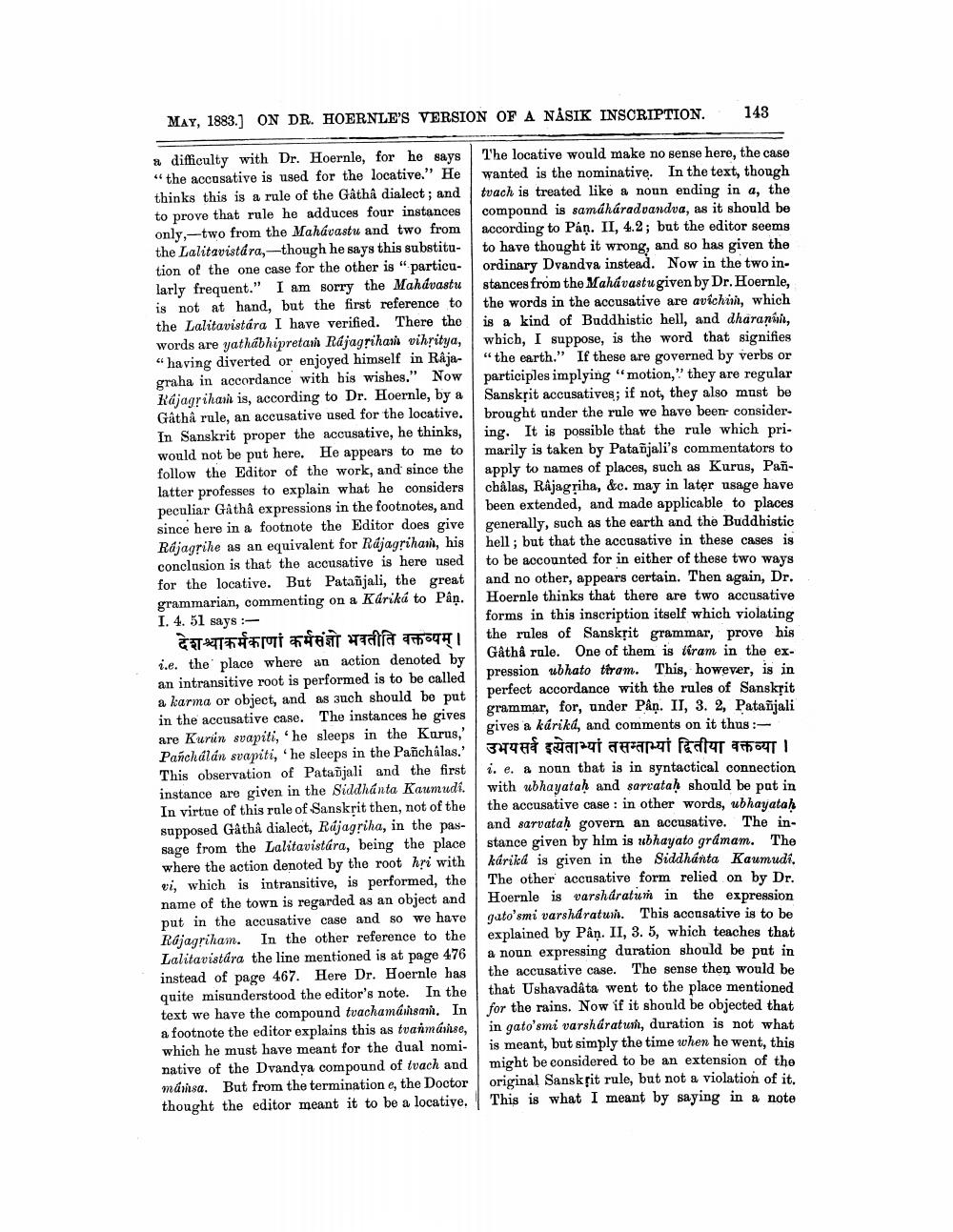________________
MAY, 1883.) ON DR. HOERNLE'S VERSION OF A NÅSIK INSCRIPTION.
143
a difficulty with Dr. Hoernle, for he says | The locative would make no sense here, the case "the accusative is used for the locative." He wanted is the nominative. In the text, though thinks this is a rule of the Gâthâ dialect; and tvach is treated like a noun ending in a, the to prove that rule he adduces four instances compound is samáháradvandva, as it should be only-two from the Mahávastu and two from according to Pán. II, 4.2; but the editor seems the Lalitavistára,-though he says this substitu- to have thought it wrong, and so has given the tion of the one case for the other is particu- ordinary Dvandva instead. Now in the two inlarly frequent." I am sorry the Mahávastu stances from the Mahávastu given by Dr. Hoernle, is not at hand, but the first reference to the words in the accusative are avichii, which the Lalitavistára I have verified. There the is a kind of Buddhistio hell, and dharanáin, words are yathábhipretar Rajagrihasi vihritya, which, I suppose, is the word that signifies “having diverted or enjoyed himself in Raja- “the earth." If these are governed by verbs or graha in accordance with bis wishes." Now participles implying "motion," they are regular Kajagrihari is, according to Dr. Hoernle, by a Sanskrit accusatives; if not, they also must be Gâthâ rule, an accusative used for the locative brought under the rule we have been considerIn Sanskrit proper the accusative, he thinks, ing. It is possible that the rule which priwould not be put here. He appears to me to marily is taken by Patañjali's commentators to follow the Editor of the work, and since the apply to names of places, such as Kurus, Panlatter professes to explain what he considerschålas, Rajagriha, &c. may in later usage have peculiar Gåthâ expressions in the footnotes, and been extended, and made applicable to places since here in a footnote the Editor does give generally, such as the earth and the Buddhistic Rajagrihe as an equivalent for Rdjagrihari, his hell; but that the accusative in these cases is conclusion is that the accusative is here used to be accounted for in either of these two ways for the locative. But Patañjali, the great and no other, appears certain. Then again, Dr. grammarian, commenting on a Kariká to Pân. Hoernle thinks that there are two accusative I. 4.51 says:
forms in this inscription itself which violating देशश्चाकर्मकाणां कर्मसंज्ञो भवतीति वक्तव्यम्।। the rules of Sanskțit grammar, prove his i.e. the place where an action denoted by
Gâthân rule. One of them is tiram in the exan intransitive root is performed is to be called
pression ubhato teram. This, however, is in a karma or object, and as such should bo put
perfect accordance with the rules of Sanskrit in the accusative case. The instances he gives
grammar, for, under Pån. II, 3. 2, Patañjali are Kurin svapiti, he sleeps in the Kurus,
gives a kárikd, and comments on it thus:Panchdlán svapiti, he sleeps in the Panchalas.' उभयसर्व इसेताभ्यां तसम्ताभ्यां द्वितीया वक्तव्या। This observation of Patañjali and the first 1. e. a noun that is in syntactical connection instance are given in the Siddhanta Kaumudi. with ubhayatah and sarcata) should be pat in In virtue of this role of Sanskrit then, not of the the accusative case : in other words, ubhayatah supposed Gåthå dialect, Rájagriha, in the pas- and sarvatah govern an accusative. The insage from the Lalitavistára, being the place stance given by him is ubhayato gramam. The where the action denoted by the root hri with kárika is given in the Siddhanta Kaumudi. ri, which is intransitive, is performed, the The other accusative form relied on by Dr. name of the town is regarded as an object and Hoernle is varsháratur in the expression put in the accusative case and so we have guto'smi varshdratu. This accusative is to be Rajagriham. In the other reference to the explained by Pân. II, 3.5, which teaches that Lalitavistára the line mentioned is at page 476 a noun expressing duration should be put in instead of page 467. Here Dr. Hoernle bas the accusative case. The sense then would be quite misunderstood the editor's note. In the that Ushavadata went to the place mentioned text we have the compound tvachamánism. In for the rains. Now if it should be objected that a footnote the editor explains this as tvanmárise, in gato'smi varsháraturi, duration is not what which he must have meant for the dual nomi- is meant, but simply the time when he went, this native of the Dyandya compound of tvach and might be considered to be an extension of the mársa. But from the terminatione, the Doctor original Sanskțit rule, but not a violation of it. thought the editor meant it to be a locative. This is what I meant by saying in a note




